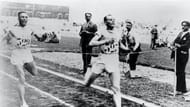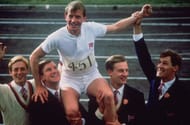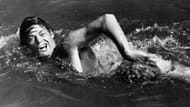With the success of the Antwerp Games, the Olympics once again regained its prominence. The quadrennial event were now to be hosted once again in Paris in 1924. 24 years after the 1900 World Fair brought the Olympics to France, the Summer Games were back in the country.
It were the last Olympics that were held under the presidency of the iconic founder, Pierre de Coubertin. In a way, these were his 'Farewell Olympics'. The Paris edition was also the first edition, where athletes stayed in an official Olympic village. These games also proved to be economically disastrous.
The Paris Games are also famous for the rise of the Finnish legend, Paavo Nurmi. Having made the world take notice with his skills at Antwerp, the Finnish soldier won five gold medals in the Games. Paavo continued to hold a grudge that he could have won a sixth gold medal had the Finnish authorities not removed his name from the 10000m.
It was at these Games that the mottos of Citius, Altius, Fortius, i.e. Faster, Higher and Stronger were first used. Also, the movie buffs remember these Olympics very well. How can't they, for it were the victories of Harold Abrahams and Eric Liddell, that formed the basis of the Oscar winning "Chariots of Fire". Both were iconic British runners in their own right.
While Eric made headlines for his religious preferences, giving up his preferred race for a religious sermon, he compensated for it with an iconic victory in the 400m. Harold, on the other hand, was a Jewish runner, who fought every kind of prejudice on his way to the top of the podium in the men's 100m.
The 1924 edition also saw the rise of American legend Johnny Weissmuller. One of the earliest actors to have immortalized the iconic role of Tarzan, Johnny was also an Olympic champion. He won his first three gold medals as a swimmer in the Paris Games. He also won a bronze medal as part of the water polo team.
Here are some more interesting facts about the 1924 edition of the Summer Olympics.
The last Olympics under Pierre de Coubertin
![Paris Olympics - The Last Games under Pierre De Coubertin's Presidency [Image for Representational Purposes]](https://staticg.sportskeeda.com/editor/2021/07/2a545-16254983850492-800.jpg?w=190)
The 1924 edition of the Summer Olympics was the last to be conducted under the presidency of Pierre de Coubertin. It was this man who had brought the Olympics back to life. It was this man who had made it so that these Games saw the light of the day.
As a result, it was natural that he was given a fitting farewell. The city of Paris was once again selected for the Summer edition. However, for the first time, the Winter Olympics also began from this year onwards. Although the first edition commenced at Chamonix, the Winter Olympics had finally taken off.
When Pierre de Coubertin took over the presidency of the International Olympic Committee, the first subsequent Olympics were naturally held in Paris in 1900. Not many know this, but when literature and art competitions were a part of the Olympics, Pierre de Coubertin had won an Olympic gold medal as well.
Coubertin won the gold medal for literature at the 1912 Summer Olympics for his poem Ode to Sport. He entered the poem under the pseudonym of Georges Hohrod and M. Eschbach. Pierre de Coubertin was ultimately succeeded in 1925 by Belgian administrator Henri de Baillet-Latour.
Paavo Nurmi - The Flying Finn

The 1924 Olympics also saw the towering success of Paavo Nurmi. The Finnish soldier had made the world take notice with a staggering three gold medals and one silver medal from the 1920 Games held at Antwerp.
In 1923, Nurmi became the first runner to hold simultaneous world records in the mile, the 5000m and the 10,000m races, a feat which has never since been repeated. However, at the Paris Olympics, Paavo was literally on a roll.
He set new world records for both 1500m and 5000m. He did that, despite the two races being an hour apart. He also won gold medals in cross country events. Seemingly unaffected by the Paris heat wave, Nurmi won all his races and returned home with five gold medals.
However, he was angry with the Finnish authorities. In his eyes, they denied him a record sixth gold medal by deliberately not entering his name for the 10000m. He further returned to win a gold medal and two silver medals at the 1928 edition of the Summer Olympics, held in Amsterdam.
Paris Olympics - The centerstage of Chariots of Fire

One of the most iconic sports dramas ever made, the "Chariots of Fire" had its script written at the Paris Olympics itself.
The movie revolves around two principal characters, Harold Abrahams and Eric Liddell. While the former is a Jewish runner, who surprised many by employing a professional coach for himself, at a time when amateurism was respected by many. The latter is a Scottish missionary who felt that by running, he was doing a great service to the Almighty.
The two characters were actual people. Harold Abrahams surprised many by winning the 100m event, which was the favorite of his compatriot, Eric Liddell. He gave it up, because it was scheduled on a Sunday, the day of his beloved Almighty.
His religious conviction in the face of an Olympic event made headlines. However, the sprinter, who had won a bronze medal in the 200m event, compensated for his bold decision, with an even bolder victory in the men's 400m - which was not his traditional event. While Harold was immortalized in the movie by Ben Cross, Ian Charleson played the role of Eric Liddell.
Rise of Johnny Weissmuller, the original Tarzan

The Paris Olympics also saw the rise of an American hero. Although he found his ultimate fame as a popular actor, his initial recognition began as a champion swimmer. His name is Johnny Weissmuller, and this is his story.
In 1922, Johnny had an opportunity to try out for the famous swimming coach Bill Bachrach. Impressed with John's performance, he took him under his wing. Bill was a strong father figure and mentor to Johnny in Olympic swimming.
On July 9, 1922, Weissmuller broke Duke Kahanamoku's world record in the 100m freestyle, swimming it in 58.6 seconds. When he made his Olympic debut at the Paris Olympics, he won the gold medal, beating Duke for the same. He also won the 400m freestyle and was a member of the winning U.S. team in the 4×200m relay.
However, it looks like Johnny wasn't done yet. He further played an important role in delivering USA a respectable bronze medal in the water polo event. He further won two more gold medals at the Amsterdam Olympics in 1928, before switching to the movies and finding fame as the first known Tarzan.
Another below-average show from India
![India at Paris Olympics - Another below-average show [Image for Representational Purposes]](https://staticg.sportskeeda.com/editor/2021/07/9168e-16254981309585-800.jpg?w=190)
Following their return to the Olympics in 1920, India once again participated in 1924. A team of almost 15 participants, including two women, represented British India at the Paris Olympics.
But like Antwerp, the Games were mostly a below average affair for Team India. Except for sprinter Terence Pitt, and to an extent tennis player, Sydney Jacob, none of the players made any good impression.
Terence Pitt participated in the sprinting events. He surprised many by qualifying for the next round in the heats of the 400m. However, he fizzled out with an average performance.
Meanwhile, Sydney Jacob was a tennis player, who surprised many with his skills. Long before Leander Paes shone on the world stage, it was Sydney Jacob who made his name as a tennis player. He surprised Watson Washburn on his journey to the quarterfinals. An American player, Washburn was one of the top players of his time. However, Sydney lost in an intense quarterfinal to Jean Borotra against France.
It wasn't until the rise of the Indian hockey team that the world even took notice of India at the Olympics. For them, India was just another participant. Until one man rose to the occasion. But his story is set for another day.
